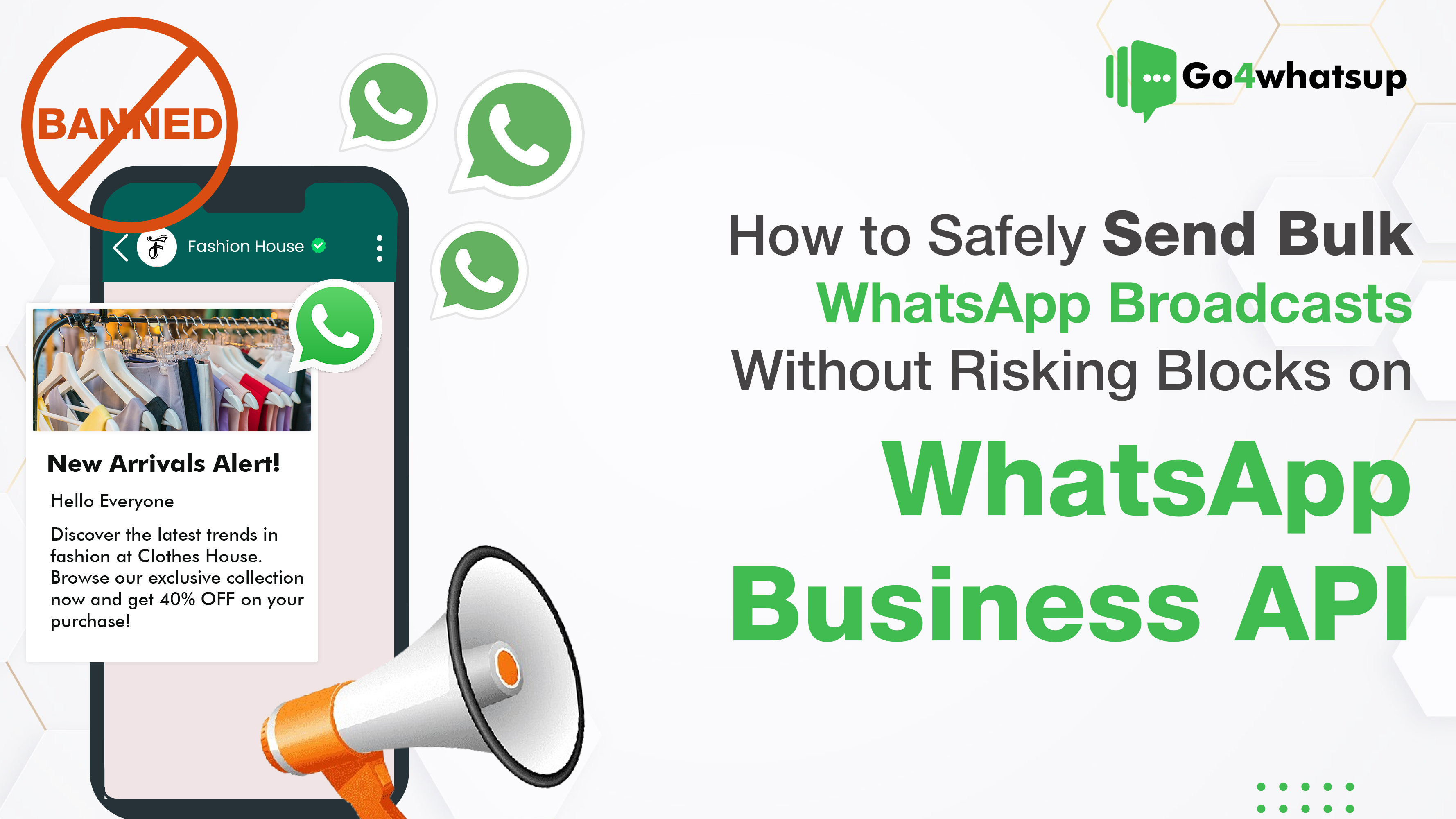
Bulk WhatsApp messaging has become one of the highest-ROI communication channels for businesses. With open rates above 90% and response times under 5 minutes, WhatsApp outperforms email, SMS, and push notifications.
However, one mistake can get your WhatsApp account permanently blocked.
Thousands of businesses lose access every month because they use unsafe bulk messaging methods, ignore WhatsApp policies, or rely on unauthorized tools.
This guide will show you exactly how to send bulk WhatsApp broadcasts safely, legally, and at scale using the WhatsApp Business API—without risking bans.
Why Businesses Are Switching to WhatsApp Bulk Messaging
Businesses today face three major communication problems:
- ❌ Emails go unopened
- ❌ SMS feels spammy and expensive
- ❌ Calls interrupt customers
WhatsApp solves all three.
Real-World Example
An eCommerce brand running festive offers via email saw a 14% open rate. When the same campaign was sent via WhatsApp (with opt-in), the open rate jumped to 92%, with 4.3x higher conversions.
That’s why industries like eCommerce, healthcare, education, logistics, and real estate are rapidly adopting WhatsApp broadcasts.
But power comes with responsibility.
The Biggest Risk: WhatsApp Account Blocks
WhatsApp is extremely strict about spam.
If users:
- Report your messages
- Block your number
- Ignore your broadcasts repeatedly
Your quality rating drops, and WhatsApp can:
- Restrict your messaging limits
- Temporarily suspend your account
- Permanently ban your number
This is where most businesses fail.
Understanding WhatsApp’s Anti-Spam & Blocking System (2025)
WhatsApp evaluates businesses using real-time trust signals, including:
- Message frequency
- User engagement
- Opt-in quality
- Content relevance
- Template approval history
Accounts Get Blocked When:
- Messages are sent without consent
- Bulk tools scrape random numbers
- Spammy language is used (“BUY NOW”, “LIMITED OFFER!!!”)
- Messages are sent too frequently
- Users report messages as spam
Important: Even genuine businesses can get blocked if they don’t follow WhatsApp’s rules.
The Only Safe Way: WhatsApp Business API
If you are serious about bulk messaging, WhatsApp Business API is mandatory.
Unlike the free WhatsApp Business App:
- ✅ Supports large-scale broadcasts
- ✅ Enforces compliance automatically
- ✅ Uses approved message templates
- ✅ Protects your account from bans
How WhatsApp Business API Prevents Bans
1. Pre-Approved Message Templates
Every bulk message must be reviewed and approved by WhatsApp.
This ensures:
- No misleading content
- No spammy language
- Clear value to the user
2. Built-In Rate Limiting
WhatsApp controls how many users you can message daily, reducing sudden spikes that trigger blocks.
3. Quality Score System
High engagement = higher sending limits
Low engagement = reduced limits
This protects genuine businesses while filtering spammers.
Step-by-Step: How to Send Bulk WhatsApp Messages Safely
Step 1: Collect Explicit User Opt-In (Non-Negotiable)
Consent is the #1 factor in WhatsApp safety.
Best Opt-In Methods:
- Website forms
- Click-to-WhatsApp Ads
- QR codes in stores
- Checkout opt-ins
- WhatsApp chat widgets
? Pro Tip: Always tell users what type of messages they’ll receive.
Step 2: Use High-Quality Message Templates
Approved templates must:
- Be informational or value-driven
- Avoid aggressive sales language
- Clearly identify your brand
Example (Safe Template):
Hi {{1}}, your order {{2}} from {{3}} has been shipped. Track it here: {{4}}. Need help? Reply anytime.
❌ Avoid:
- “LIMITED OFFER”
- “ACT NOW”
- “FREE!!!”
Step 3: Segment Your Audience (Critical for Engagement)
Sending the same message to everyone kills engagement.
Instead, segment by:
- Purchase history
- Location
- Industry
- Behavior
- Interest
Real Example
A real estate firm sent site visit reminders only to warm leads, improving reply rates by 68% and avoiding spam reports entirely.
Step 4: Control Frequency & Volume
Even opted-in users don’t want daily promotions.
Best Practice (2025):
- 1–2 promotional messages/week
- Unlimited transactional updates
- Gradual scaling of message volume
WhatsApp rewards consistent behavior, not sudden spikes.
Step 5: Monitor Quality Metrics Daily
Track:
- Read rates
- Reply rates
- Block rates
- Spam reports
Low engagement?
➡ Improve personalization
➡ Reduce frequency
➡ Refine targeting
Common Mistakes That Get Businesses Banned
❌ Using Chrome extensions for bulk WhatsApp
❌ Buying contact lists
❌ Sending messages without opt-in
❌ Ignoring negative feedback
❌ Over-promotion
One wrong tool can destroy years of brand trust.
What to Do If Your WhatsApp Account Gets Blocked
Immediate Actions:
- Stop all messaging
- Contact your WhatsApp BSP
- Review template violations
- Submit appeal with opt-in proof
Accounts using official WhatsApp API platforms recover 4x faster than unofficial tools.
Why Businesses Choose Go4Whatsup for Safe Bulk Messaging
Go4Whatsup is a Meta-approved WhatsApp Business Solution Provider, trusted by fast-growing brands.
Key Advantages:
- Official WhatsApp Business API access
- Built-in broadcast automation
- Message template approval support
- Real-time analytics
- AI-powered chatbots
- Omnichannel inbox
Conversion-Focused Use Cases
eCommerce
- Order updates
- Cart abandonment reminders
- Festive sales (opt-in only)
Healthcare
- Appointment reminders
- Lab report notifications
- Prescription updates
Education
- Admission alerts
- Class schedules
- Fee reminders
Logistics
- Delivery updates
- COD confirmations
- Delay notifications
Final Thoughts: Safe Bulk WhatsApp Messaging Is a Strategy, Not a Hack
WhatsApp rewards businesses that:
- Respect users
- Deliver value
- Follow rules
- Use official APIs
There are no shortcuts—but when done right, WhatsApp becomes your highest-converting channel.
✅ FAQs
Q1. Can I send bulk WhatsApp messages without getting blocked?
Yes, if you use WhatsApp Business API, get user opt-in, and follow template rules.
Q2. Is WhatsApp Business App safe for bulk messaging?
No. The app is limited and unsafe for large-scale broadcasts.
Q3. How many messages can I send daily on WhatsApp API?
Limits depend on your quality rating and account trust level.
Q4. What happens if users report my WhatsApp messages?
Your quality score drops, and WhatsApp may restrict or block your account.
Q5. Is WhatsApp bulk messaging legal?
Yes, when done with explicit user consent and approved templates.


